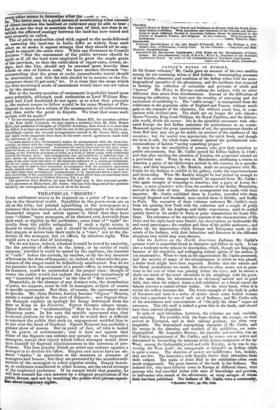THEATRICAL "RIGHTS."
SOME settlement seems to be required on a point of law or cus- tom in the theatrical world. Squabbles in the green-room are as old as the bills; but printed squabbling in the newspapers is a nuisance that has increased, is increasing, and oug-ht to be abated. Successful singers and actors appear to think that they have some "claims" upon managers, of an abstract sort, derivable from their rank or dignity in the profession; some kind of "right" de- rivable from the public estimation. If such a right exists, it should be clearly defined, and it should be distinctly understood that singers or actors take their parts in a " cast," not at the dis- cretion of the manager, but ex officio, by inherent right. This would save a vast deal of bickering. We do notknow, indeed, whether it could be tested by seniority, like the priority of officers in the Army, or by extent of vocal compass ; whether it could be meted by the applause, the number of "calls" before the curtain, by encores, or by the dry measure of flowers in the form of bouquets ; or, indeed, by what test the pre- cedence of the singer could be definitively ascertained. Nor do we yet perceive how the occupant of a patent office, in tenor-singing i for nstance, could be superseded at the proper time ; though of course the public would not endure the perpetual incumbency of any "immortal old gentleman" in the line of "first lovers.'
Meanwhile, in the absence of any distinct rule, the distribution of parts, we suppose, must be left to managers, subject of course to specific agreement. But then, of course, the agreement must be specific. Mr. Sims Reeves, having become " Signor " Reeves, asserts a vested right in the part of Edgard°' and Signor Gior- gio Ronconi expects an apology for being dethroned from his slate as King in La Favorita. Signor Giorgio alleges usage, Signor Reeves an " understanding" that he was to play divers illustrious parts. In his case the specific agreement was, that he should perform for five nights ; and he would find it difficult to convince the public that such an engagement entitled him to be put over the head of Gardoni. Signor Ronconi has probably a greater show of reason. But in point of fact, all title is tested by its power of enforcement; and it does not appear that either of the Signors can enforce any penalty on the respective managers, except that injury which either manager would draw upon himself by flagrant injudiciousness in the selection of per- formers. The true penalty which an artist can enforce against a manager is to decline his offers. Singers and actors have no ab- stract "rights" in opposition to the interests or pleasure of Managers and lessees ; but they are protected by the manifest self- interest of the managers to select popular artists. Empty bench- es, or audiences transferred to other houses, are the sweet revenge of' the neglected performer. If he cannot wield that penalty, he Will best consult his own interest by a diligent propitiation of the kit& favour, and not by troubling the public with privatempab-
Whoutionsinary rights.


























 Previous page
Previous page